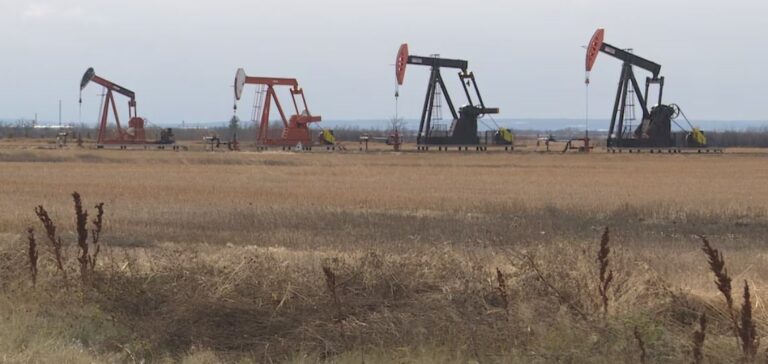Peeling red paint, broken pressure gauge, cranks on the ground… like hundreds of thousands of others, this oil well in western Canada has been shut down for several decades without ever having been closed.
The proliferation of inactive wells in Canada: an ecological bomb threatening the environment
Most of these small boreholes, often dug hundreds of meters below the surface in search of Alberta’s rich oil and gas deposits, are “eroding and degrading”, explains activist Regan Boychuk. And they are now an ecological time bomb in Canada, where oil and gas are still king, employing almost 600,000 people. “Each one has to be managed, monitored for eternity because of the risk of leaks” of gas but also oil into nearby groundwater, adds the founder of Reclaim Alberta, an organization fighting for the closure of these abandoned wells.
Even more worrying, they continue to emit a very powerful greenhouse gas: methane. Over twenty years, it has “86 times more impact than one molecule of carbon dioxide”, points out Mary Kang of McGill University, a specialist in the subject. And it’s probably an “underestimated” source of pollution: “the margin of uncertainty is large” given the number of wells, adds the expert.
The explosion of inactive wells: the environmental legacy of Canada’s oil industry
More than 120,000 wells are inactive and unsealed in Alberta and Saskatchewan, the two provinces that are home to 91% of Canadian wells, according to a 2022 federal report. Combined, they emit 16,000 tonnes of methane – 545,000 tonnes of carbon dioxide – per year over a century, equivalent to the annual emissions of around 237,000 cars.
Most of the wells were built from the 1860s, at the start of the oil industry boom, until the late 1940s, in a country that ranks fourth worldwide in terms of proven oil reserves. But after decades of expansion, inactive wells multiplied in the 2010s, particularly after the drop in the price of oil in 2014.
Under the so-called “polluter pays” principle, oil and gas companies are obliged to finance the plugging and clean-up of sites, but there is no legislation setting a deadline for doing so. The associations denounce the fact that they are indefinitely postponing sanitation work. For them, it’s still much cheaper to pay rent to the landowner even for an inactive well than to finance the thousands of dollars needed to clean it up.
The challenge of orphan wells in Alberta: a headache for authorities and owners alike
Another case in point: some wells become “orphaned” when the company managing them goes bankrupt. A headache for the authorities. In the space of ten years, Alberta has seen the number of orphaned wells explode, from 700 in 2010 to nearly 10,000 by 2023. And Ottawa estimates that the cost of cleaning these wells will triple in five years, reaching at least 1.1 billion Canadian dollars (748 million euros) by 2025. The Alberta Orphan Well Association, funded mainly by oil companies, claims to be able to clean up abandoned wells within 10 to 12 years.
Albert Hummel, a farmer and rancher in southern Alberta, had seven abandoned boreholes on his land. Five have finally been closed, but there are still two to be cleaned.
“It’s a long process, it takes time,” details the farmer who has additionally lost the income from the rents paid for these wells since the oil company that operated them went bankrupt in 2019.
When the soil is contaminated, it takes several decades for the pollutants to evaporate before work can begin. Once decontaminated, the boreholes are sealed with cement and the site is returned to its original state. Each layer of soil is replaced and the ground levelled.
Right in the middle of one of his fields, the remains of an oil well still prevent Albert Hummel from working, causing “a loss of production”, he says bitterly, pointing to the pipes protruding from the ground.
To make up for this loss, a small company is proposing to install solar panels on the site until it can be cleaned. “It gives the contaminants a bit more time to evaporate, while producing renewable energy” whose revenues go to the landowner, explains Daryl Bennett of the company RenuWell, pointing to the power poles that could be recycled.
But these solutions remain a drop in the ocean of sites to be cleaned. And “greenhouse gas emissions from these legacy infrastructures will not go away,” notes Mary Kang. “We’ll still have to manage them for decades to come.”






















